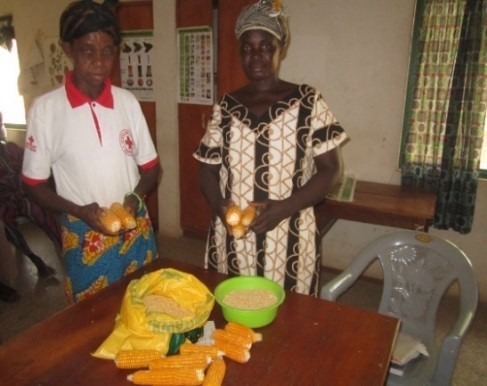
Two JFN members, who used organic, home-grown compost, showcase maize and soybeans from their harvests.
Agriculture in northwestern Ghana has long been dominated by smallholder farmers who grow limited amounts of crops, primarily for home consumption. As demand for their crops has increased in recent years, farmers have struggled to increase production as traditional farming methods have hindered their efforts. In addition, the cancellation of a government-subsidized fertilizer program in 2014 has prevented farmers from accessing the fertilizers needed to increase production.
In response to the challenges faced in accessing a reliable and cost-effective source of fertilizer, local farmers’ association Jirapa Farmers Network (JFN), which is located in nine communities across Jirapa District, requested technical assistance from the Farmer-to-Farmer (F2F) program. Dr. Bill Zimmerman, an agricultural and environmental microbiologist from Missouri who previously served as an F2F volunteer in Liberia, arrived in Ghana in November 2014 and quickly set to work.
“Thanks to the F2F volunteer, I now know the waste generated in my home and farm can be useful. Although the preparation of compost is time and labor intensive, it is cost effective, and I will keep using it to supplement the inorganic fertilizer so as to reduce my cost of production and improve soil fertility.’’ – Karimu, Chairman of JFN
In collaboration with JFN, Dr. Zimmerman and trainee members constructed five demonstration compost pits on the group’s shared one-acre farm to show farmers how to prepare organic, mineral-rich compost. In addition, several members also dug compost pits on their own farms instead of applying inorganic fertilizer, which is more expensive. Dr. Zimmerman also showed farmers how to properly apply the compost.
At the end of the season, farmers who applied organic compost grew as much maize and soybeans as farmers who used inorganic fertilizer—and realized significant cost savings in the process. Buoyed by this evidence, many farmers in the region have switched to composting, which will allow them to reduce costs and increase production as they now have a reliable source of fertilizer. As a result of F2F assistance, JFN leaders are proudly and enthusiastically training other communities in composting to help them improve their farming practices for increased profits and greater food production in the region.








